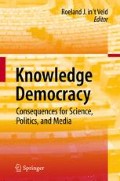Abstract
In this chapter we analyse the process of knowledge production between experts, bureaucrats and stakeholders. From our two in-depth Dutch case studies we conclude that the interplay between experts and bureaucrats is not very problematic in knowledge production, because of discipline congruence and institutionalised relations between the two in the field of water management. The interplay between stakeholder knowledge on the one hand and expert and bureaucratic knowledge on the other is more problematic and leads to problems of legitimate knowledge production and decision-making.
Access this chapter
Tax calculation will be finalised at checkout
Purchases are for personal use only
Preview
Unable to display preview. Download preview PDF.
Edelenbos, J. , Van Schie, N. and Gerrits, L. (2009). Organizing interfaces in water governance: how to interconnect interactive processes with democratic institutions? Policy Sciences, Online First, 05/05/2009 (DOI 10.1007/s11077-009-9086-2).
Rinaudo, J.D. and Garin, P. (2005). The benefits of combining lay and expert input for water-management planning at the watershed level. Water Policy, 7, 279–293.
Petts, J. and Brooks, C. (2006). Expert conceptualizations of the role of lay knowledge in environmental decisionmaking: challenges for deliberative democracy. Environment and Planning A, 38, 1045–1059.
Lintsen, H. (2002). Two centuries of central water management in the Netherlands. Technology and Culture, 43, 549–568.
McClean, S. and Shaw, A. (2005). From schism to continuum? The problematic relationship between expert and lay knowledge: an exploratory conceptual synthesis of two qualitative studies. Qualitative Health Research, 15(6), 729–749.
Hunt, J. and Shackley, S. (1999). Reconceiving science and policy: academic, fiducial and bureaucratic knowledge. Minerva, 37, 141–164.
Van Buuren , A. and Edelenbos, J. (2004). Conflicting knowledge: why is knowledge production such a problem? Science and Public Policy, 31(4), 289–299.
Pielke, R.A. (2007). The Honest Broker: Making Sense of Science in Policy and Politics. Cambridge (UK): Cambridge University Press.
Nowotny, H. , Scott, P. and Gibbons, M. (2002). Re-thinking Science: Knowledge and the Public in an Age of Uncertainty. Cambridge (UK): Polity Press.
Bernstein, R.J. (1991). The New Constellation: The Ethical-Political Horizons of Modernity/Postmodernity. Cambridge (USA): MIT Press.
Edelenbos, J. (2005). Institutional implications of interactive governance: insights from Dutch practice. Governance, 18(1), 111–134.
Eshuis, J. and Stuiver , M. (2005). Learning in context through conflict and alignment: farmers and scientists in search of sustainable agriculture. Agriculture and Human Values, 22(2), 137–148.
Hajer, M. and Wagenaar, H. (2003). Deliberative Policy Analysis: Understanding Governance in the Network Society. Cambridge (UK): Cambridge University Press.
Irwin, A. , Simmons, P. and Walker, G. (1999). Faulty environments and risk reasoning: the local understanding of industrial hazards, Environment and Planning A, 31, 1311–1326.
Kingdon, J.W. (1984). Agendas, Alternatives and Public Policies. Boston: Little, Brown and Company.
Wynne, B. (1991). Knowledges in context: science. Technology, and Human Values, 16, 111–121.
Latour, B. (1999). Pandora’s Hope: Essays on the Reality of Science Studies. Cambridge (USA): Harvard University Press.
Knorr-Cetina, K. (1999). Epistemic Cultures: How the Sciences Make Knowledge. Cambridge (USA): Harvard University Press.
Woolgar, S. (2000). Social basis of interactive social science. Science and Public Policy, 27(3), 165–173.
Ehrmann, J.R. and Stinson, B.L. (1999). Joint fact-finding and the use of technical experts. In: Susskind, L. , McKearnan, S. and Thomas-Larmer, J. (Eds.), The Consensus Building Handbook: A Comprehensive Guide to Reaching Agreement. London: Sage, 375–400.
Hoppe, R. (1999). Policy analysis, science and politics: from ‘speaking truth to power’ to ‘making sense together’. Science and public Policy, 26(3), 201–210.
Innes, J.E. , and Booher, D.E. (1999). Consensus building and complex adaptive systems: a framework for evaluating collaborative planning. Journal of the American Planning Association, 65, 412–423.
Busenberg, G.J. (1999). Collaborative and adversarial analysis in environmental policy. Policy Sciences, 32, 1–11.
Caswill, C. and Shove, E. (2000). Introducing interactive social science. Science and Public Policy, 27(3), 154–157.
Lindblom, C.E. and Cohen , D.K. (1979). Usable Knowledge: Social Science and Social Problem Solving. New Haven: Yale University Press.
Backstrand, K. (2003). Civic science for sustainability: reframing the role of experts, policy-makers and citizens in environmental governance. Global Environmental Politics, 3(4), 24–41.
Jasanoff, S. (1990). The Fifth Branch: Advisers as Policy Makers. Cambridge (USA): Harvard University Press.
Yearley, S. (2000). Making systematic sense of public discontents with expert knowledge: two analytical approaches and a case study. Public Understanding of Science, 9, 105–122.
Petts, J. (1997). The public-expert interface in local waste management decisions: expertise, credibility, and process. Public Understanding of Science, 6, 359–382.
Gallopín, G.C. , Funtowicz, S. , O’Connor, M. and Ravetz, J. (2001). Science for the twenty-first century: from social contract to the scientific core. International Journal of Social Science, 168(2), 219–229.
Ravetz, J. (1999). What is post-normal science? Futures, 31(4), 647–653.
De Bruijn , J.A. and Ten Heuvelhof, E.F. (1999). Scientific expertise in complex decision-making processes. Science and Public Policy, 26(3), 179–184.
Van Schie, N. and Bouma, J.J. (2008). The concept of covaluation: institutionalizing the involvement of local (public) values in regional planning on water. Competition and Regulation in Network Industries, 9(4), 363–396.
Van Buuren, M.W. (2006). Competente besluitvorming: het management van meervoudige kennis in ruimtelijke ontwikkelingsprocessen. The Hague: Lemma.
Author information
Authors and Affiliations
Corresponding author
Editor information
Editors and Affiliations
Rights and permissions
Copyright information
© 2010 Springer-Verlag Berlin Heidelberg
About this chapter
Cite this chapter
Edelenbos, J., van Buuren, A., van Schie, N. (2010). Knowledge synchronisation: interactive knowledge production between experts, bureaucrats and stakeholders. In: in 't Veld, R. (eds) Knowledge Democracy. Springer, Berlin, Heidelberg. https://doi.org/10.1007/978-3-642-11381-9_12
Download citation
DOI: https://doi.org/10.1007/978-3-642-11381-9_12
Published:
Publisher Name: Springer, Berlin, Heidelberg
Print ISBN: 978-3-642-11380-2
Online ISBN: 978-3-642-11381-9
eBook Packages: Business and EconomicsEconomics and Finance (R0)

